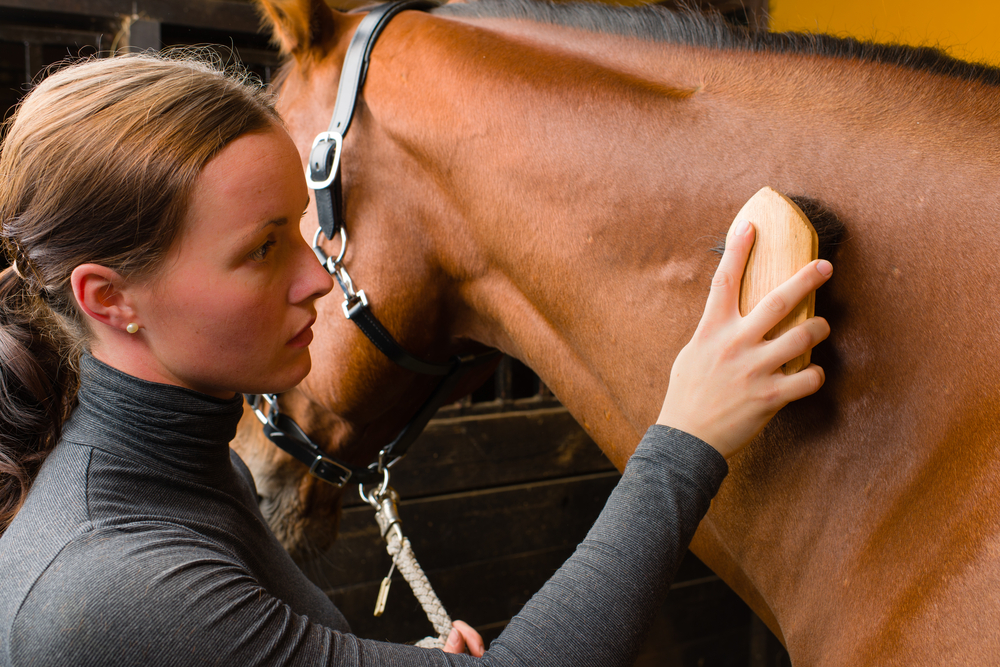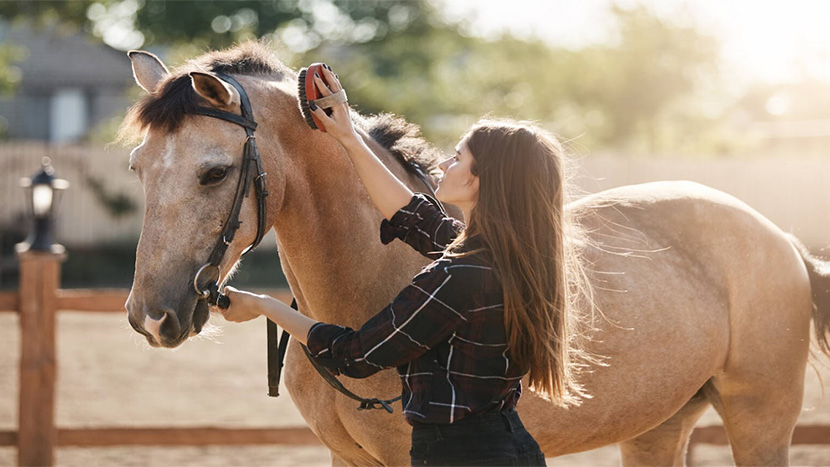As our beloved horses age, they require special attention to ensure they remain healthy and happy. Understanding how to care for an older horse is crucial for any horse owner who wants to provide the best quality of life for their equine companions. This article will guide you through all aspects of caring for an older horse, from diet and exercise to health monitoring and creating a comfortable environment.

The Importance of a Balanced Diet
One of the most critical aspects of caring for an older horse is providing a balanced diet that meets their changing nutritional needs. As horses age, their metabolism slows down, and they may have difficulty digesting certain types of feed. Its essential to choose a diet that is rich in fiber and low in sugar.
Choosing the Right Feed
When selecting feed for your older horse, opt for high-quality hay or pasture that is easy to chew and digest. Consider incorporating senior feed, which is specifically formulated to meet the nutritional needs of aging horses. These feeds typically contain added vitamins, minerals, and protein to support overall health.
Monitoring Weight and Body Condition
Regularly monitor your horses weight and body condition to ensure they are maintaining a healthy weight. Older horses are prone to weight loss due to dental issues or decreased appetite. If you notice significant weight changes, consult with a veterinarian to adjust their diet accordingly.
Exercise and Mobility
Maintaining mobility is essential for the health and well-being of an older horse. While they may not be able to perform at the same level as they did in their younger years, regular gentle exercise can help keep their muscles and joints healthy.
Creating a Safe Exercise Routine
Develop a low-impact exercise routine that includes light riding, walking, or turnout in a safe pasture. Avoid strenuous activities that could cause strain or injury. Tailor the routine to your horses individual needs and capabilities.
Addressing Mobility Issues
Older horses may experience stiffness or joint pain, which can affect their mobility. Consider adding joint supplements to their diet and consult with a veterinarian for appropriate pain management strategies. Regular hoof care is also essential to prevent discomfort and maintain mobility.
Health Monitoring and Veterinary Care
Regular veterinary care is a cornerstone of older horse care. Schedule routine check-ups to monitor your horses overall health and address any issues promptly. Preventative care can significantly enhance their quality of life.
Dental Health
Dental issues are common in older horses and can affect their ability to eat and maintain weight. Regular dental exams are crucial to identify and address any problems such as back teeth problems or dental exams. A professional equine dentist can provide necessary treatments to keep your horses mouth healthy.
Regular Health Check-Ups
Regular health check-ups with a veterinarian are vital to detect and treat age-related conditions such as arthritis, Cushings disease, or metabolic syndrome. Your vet can also recommend vaccinations and deworming schedules tailored to your horses needs.
Creating a Comfortable Environment
Providing a comfortable and safe environment is essential for the well-being of your older horse. Ensure they have access to shelter, clean water, and a comfortable resting area.
Stable Management
Maintain a clean and well-ventilated stable to prevent respiratory issues. Bedding should be soft and absorbent, and stalls should be checked regularly for cleanliness.
Pasture Management
If your horse spends time in the pasture, ensure it is free of hazards and has adequate fencing. Provide access to shade and clean water at all times. Regularly inspect the pasture for poisonous plants or debris that could cause harm.
Social Interaction
Horses are social animals, and maintaining social interactions is crucial for their mental well-being. Allow your older horse to interact with other compatible horses to prevent loneliness and boredom.
Introducing New Companions
If introducing new companions, do so gradually to ensure compatibility and reduce stress. Monitor interactions to prevent bullying or aggression.
Providing Enrichment
Enrichment activities such as toys, grooming, or light training sessions can keep your horse mentally stimulated and happy. Tailor these activities to your horses interests and abilities.
Understanding Behavioral Changes
As horses age, they may exhibit behavioral changes due to physical discomfort or cognitive decline. Understanding and addressing these changes is essential for their quality of life.
Identifying Behavioral Changes
Common behavioral changes in older horses include increased aggression, lethargy, or changes in eating habits. Monitor your horse closely and consult with a veterinarian if you notice significant changes.
Addressing Behavioral Issues
Address behavioral issues by ensuring their environment is comfortable and free of stressors. Providing consistent routines and positive reinforcement can help manage anxiety or confusion.
Conclusion
Caring for an older horse requires patience, understanding, and a commitment to their well-being. By providing a balanced diet, regular exercise, veterinary care, and a comfortable environment, you can ensure your senior horse enjoys a happy and healthy life. Remember, each horse is unique, and tailoring care to their individual needs is the key to successful older horse care.

FAQs
What is the best diet for an older horse?
The best diet for an older horse is one that is high in fiber and low in sugar. Senior feeds that contain added vitamins and minerals are often recommended to meet their nutritional needs.
How often should an older horse see a veterinarian?
An older horse should see a veterinarian at least twice a year for routine check-ups. Regular dental exams and vaccinations are also essential.
How can I tell if my older horse is in pain?
Signs of pain in older horses include changes in behavior, reduced appetite, weight loss, or reluctance to move. Consult with a veterinarian if you suspect your horse is in pain.
This article contains affiliate links. We may earn a commission at no extra cost to you.
